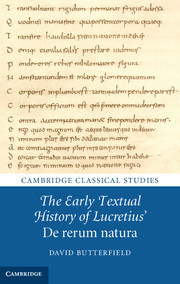Description
The Early Textual History of Lucretius' De rerum natura
Cambridge Classical Studies Series
Author: Butterfield David
Surveys the first millennium in the circulation of Lucretius' De rerum natura, analysing its ancient readers, annotators, scribes and owners.
Language: English
Subject for The Early Textual History of Lucretius' De rerum natura:
Approximative price 107.81 €
In Print (Delivery period: 14 days).
Add to cart
The Early Textual History of Lucretius' De rerum natura
Publication date: 10-2013
368 p. · 14.3x22.3 cm · Hardback
Publication date: 10-2013
368 p. · 14.3x22.3 cm · Hardback
Approximative price 31.58 €
In Print (Delivery period: 14 days).
Add to cart
The Early Textual History of Lucretius' De rerum natura
Publication date: 01-2019
Support: Print on demand
Publication date: 01-2019
Support: Print on demand
Description
/li>Contents
/li>Biography
/li>
This is the first detailed analysis of the fate of Lucretius' De rerum natura from its composition in the 50s BC to the creation of our earliest extant manuscripts during the Carolingian Age. Close investigation of the knowledge of Lucretius' poem among writers throughout the Roman and medieval world allows fresh insight into the work's readership and reception, and a clear assessment of the indirect tradition's value for editing the poem. The first extended analysis of the 170+ subject headings (capitula) that intersperse the text reveals the close engagement of its Roman readers. A fresh inspection and assignation of marginal hands in the poem's most important manuscript (the Oblongus) provides new evidence about the work of Carolingian correctors and offers the basis for a new Lucretian stemma codicum. Further clarification of the interrelationship of Lucretius' Renaissance manuscripts gives additional evidence of the poem's reception and circulation in fifteenth-century Italy.
Preface; Introduction; 1. A sketch of the extant Lucretian manuscripts; 2. The indirect tradition of Lucretius; 3. The capitula of DRN; 4. The correcting hands of O; 5. The marginal annotations of Q1; Conclusion; Appendix 1. Capitula Lucretiana; Appendix 2. Apparatus fontium Lucreti (ante a.d. millesimum); Appendix 3. The corrections and annotations of O; Appendix 4. The foliation of the Lucretian archetype; Appendix 5. The fate of OQS in the early modern period.
David Butterfield is a Fellow of Queens' College and Lecturer in Classics at the University of Cambridge.
© 2024 LAVOISIER S.A.S.
These books may interest you

Introduction to Lucretius 26.37 €



